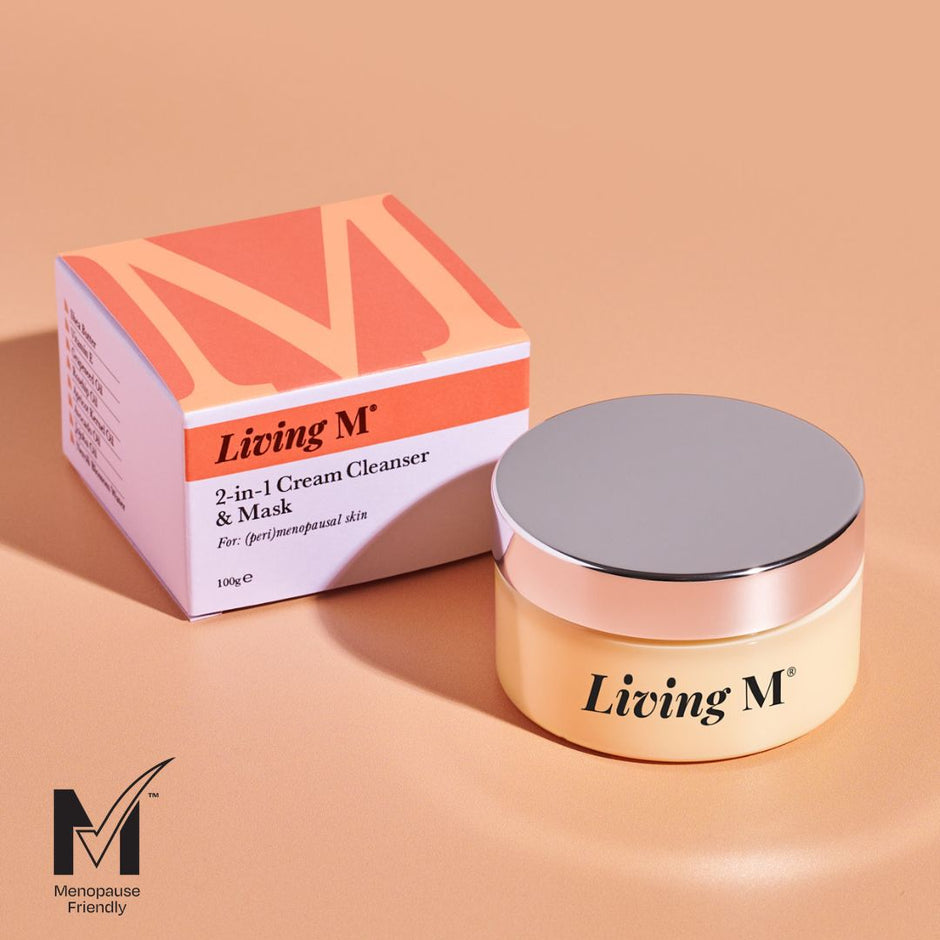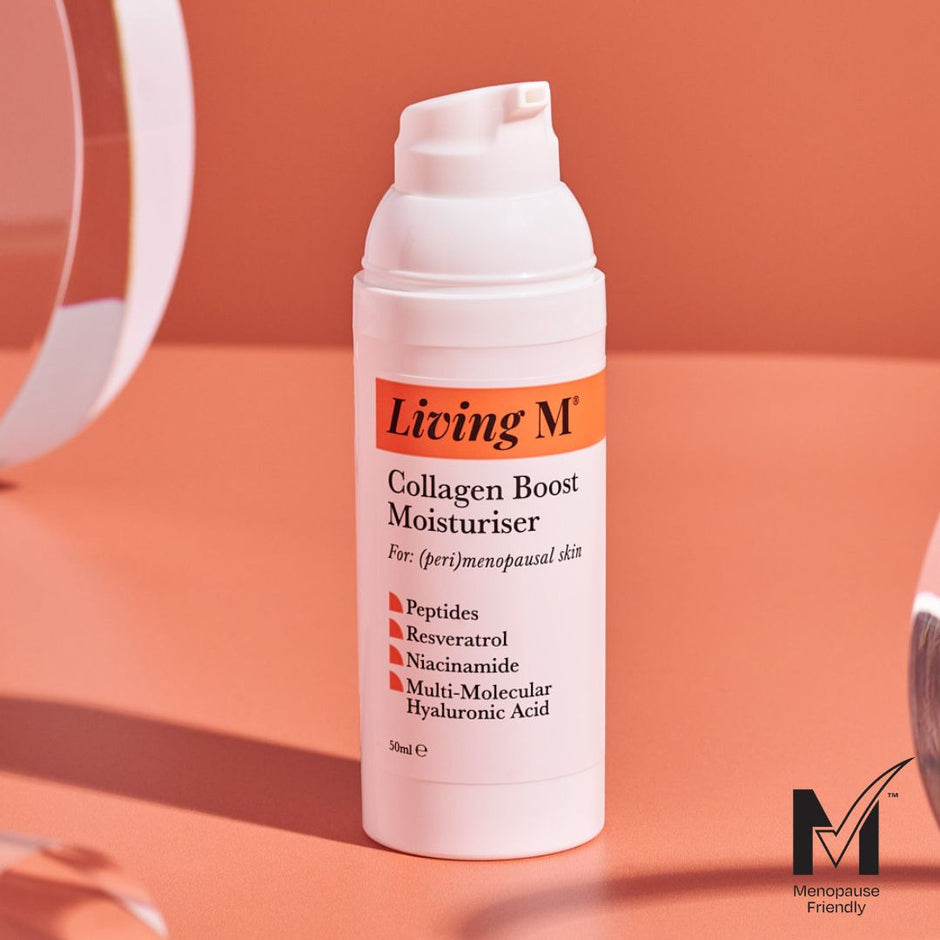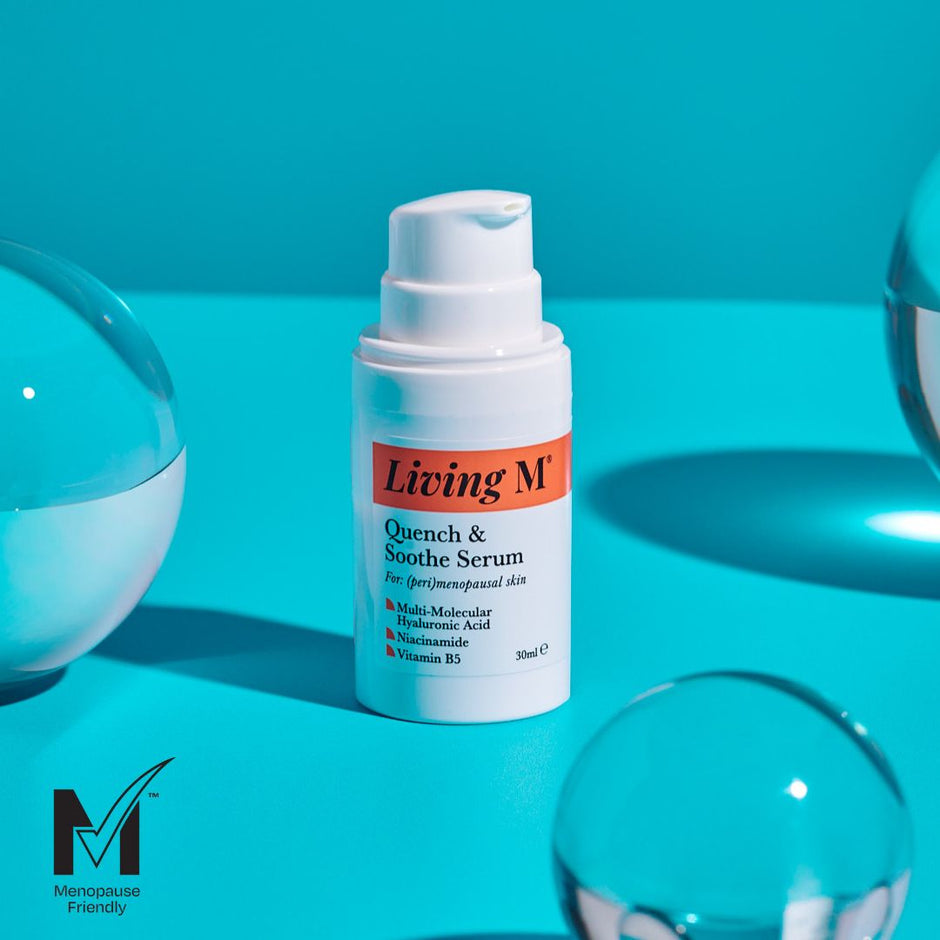When we developed Living M, the most important thing for us was to design a range of products using the highest quality, proven skincare ingredients. Every ingredient has been chosen specifically to maximise skin health and condition in menopause.
So, you will find all our products are expertly formulated with active ingredient combinations that deliver real results when your skin needs it most. What we chose to leave out is just as important as what we put in. At Living M, we don’t use any filler ingredients and avoid all known skin irritants in our products. In menopause, there are certain common skincare ingredients that you need to avoid. They are used in many skincare products, and it pays to know what they are.
WHY WE NEED TO AVOID CERTAIN SKINCARE INGREDIENTS IN MENOPAUSE?
Fluctuating hormones can have a dramatic effect on the condition of our skin. In the first 5 years of menopause, 30% of collagen is lost due to declining levels of oestrogen. As a result, our skin barrier starts to weaken leaving skin prone to increased irritation and inflammation. The skin barrier is the outermost layer of the skin's surface. Often compared with a brick wall, it is a protective structure essential for healthy skin. Essential nutrients like fatty acids, cholesterol and ceramides collectively called "skin's natural moisturising factor" help make up the skin barrier. The skin barrier essentially keeps the good stuff in and the bad stuff out, locking in moisture and protecting against environmental stressors. As the skin barrier weakens in menopause, external stressors can get into the skin causing irritation and redness. Lacking in natural moisturisers, menopausal skin becomes more sensitive, reactive and prone to irritation.
Many women find that products they have been happily using for years with no issues can suddenly start to irritate. In menopause, it’s really important to avoid harsh and irritating ingredients that can further weaken your skin barrier.
WHAT SKINCARE INGREDIENTS SHOULD I AVOID IN MENOPAUSE
FRAGRANCE AND SKIN IRRITATION
Fragrance is used in so many skincare products, but it has absolutely no benefit for the condition of your skin and is added to products simply to make them smell more appealing. It is, however, the number one cause of skin irritation in facial skincare. It can cause irritation in two different ways. Firstly, fragrance can trigger irritant contact dermatitis which is caused by fragrance irritating the outer layer of your skin. This can disrupt your skin barrier and cause inflammation. If your skin barrier is already weaker, as it is in menopause, the risk of sensitivity is even greater. Signs of skin barrier damage include dryness, redness, stinging and breakouts. The second way fragrance can affect your skin is allergic contact dermatitis in which your skin triggers and allergic immune response to fragrance – identifying it as a foreign body. This can cause dryness, redness and flaking making skin even drier than it already is due to collagen loss. In menopause choosing fragrance free products is a must.
ESSENTIAL OILS AND MENOPAUSE
We love the scent of an essential oil but they really have no place on your face. They have the potential to aggravate skin and it’s best to steer clear of them entirely from the neck up in menopause. Essential oils can be extracted from flowers, bark, sleaves, stem and roots. They add fragrance to products but the risk of irritation to skin is high, especially in menopause, when your skin barrier is weakened. Natural doesn’t mean better and most of the components in oils have the potential to cause damage and irritation when applied to the face. Stick to essential oils below the neck in menopause – it’s not worth the risk to your complexion.
DRYING ALCOHOL IN SKINCARE
Drying ethyl alcohol or “alcohol denat” is used in a lot of skincare products but it can be very problematic for skin. It dries out skin and causes inflammation by depleting vital substances needed for healthy skin. Drying alcohols can destroy your skin’s natural barrier and should be avoided in facial skincare.
Not all alcohols are bad in skincare – fatty alcohols are great ingredients for dry skin – cetyl, stearyl and cetearyl are all skin-friendly. You need to avoid anything containing ethyl “alcohol” or “alcohol denat” – check the ingredients list of your products and if it contains drying alcohol don’t risk using it.
SKINCARE THAT IS SULPHATE, PARABEN & SILICONE FREE
We have also chosen to formulate or products without sulphates, parabens or silicones. These ingredients may cause irritation for those with sensitive skin and are somewhat controversial in skincare. While silicones aren’t necessarily bad ingredients for your skin they don’t actually contribute to the health of your skin. They are added to products simply to make them feel better on application - their benefits are purely superficial – that slippery feel you sometimes get from a moisturiser is the silicone at work.
At Living M, we are passionate about setting the highest standards for skincare specifically designed for hormonal skin changes experienced in menopause. Because we know that it is just as much about what we don't include as what we do.




